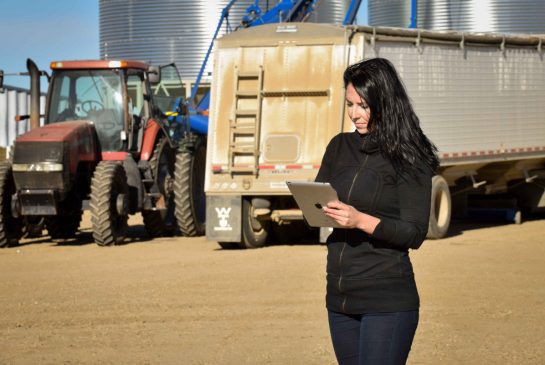For Normally Stoic Farmers, the Stress of Climate Change can be Too Much to Bear
Published on by Naizam (Nai) Jaffer, Municipal Operations Manager (Water, Wastewater, Stormwater, Roads, & Parks) in Academic
Farms are on the front lines of climate change, and few people confront the stresses of extreme weather as intimately as farmers
The wind was unusually strong, and it swept across Saskatchewan farmland without warning or mercy to canola farmers who had just cut and laid out their crops to dry.
Kim Keller, 31, remembers the mid-September day clearly. It was 2012, her first year working back on the family’s 4,900-hectare grain farm in Gronlid, a hamlet about 200 kilometres northeast of Saskatoon. An auto insurance adjuster for the previous six years, Keller realized after a decade away that the farm is where she yearned to be.
The windstorm was fast, furious and persistent. “We watched as all our hard work was literally blown away,” Keller said. “I wondered to myself, what did I just do? I had quit a stable job, and in my first year of farming my crop was literally gone. It had a massive impact on our livelihood.”
The stress led to anxiety and despair that Keller has learned is all too common — and poorly understood — in farming communities. She worries that climate change is amplifying mental distress as farmers struggle with floods, unseasonable frosts, with floods and windstorms scientists say are becoming more frequent and severe.
Planting crops year to year is becoming a “roll of the dice,” said Keller, a third-generation farmer.
“The weather we tend to experience lately seems to be at one extreme or the other — drought or flooding, -40 C or 35 C. These unpredictable and extreme weather patterns add to all the other stressors farmers experience and deal with.”

When extreme weather hits, such as the droughts of 2001 and 2002 and floods in 2010 and 2011, it can reduce crop yields by as much as 50 per cent, according to Agriculture and Agri-Food Canada.
A report published in January by researchers at the University of British Columbia and McGill University found that between 1964 and 2007 crop damage from extreme weather, mostly drought, reduced production in Canada, the United States and Australia by an average of 20 per cent — double the global average.
Co-author Navin Ramankutty, a professor of global food security at UBC, said the data cautiously suggests that extreme events are occurring more frequently over time. More certain, he added, is “more recent events have had a greater impact.”
A warming climate with more volatile weather can also weaken crops, making them more vulnerable to weeds, insects and disease.
Farmers already have it tough.
The World Health Organization has long identified farming as having among the highest rates of occupation-related depression and suicide, particularly during times of economic hardship. Climate change is expected to amplify that stress, taking a toll around the world.
Part of the challenge is that farmers are a stoic bunch. They don’t like to talk about their mental health, bottling it up until it reaches a breaking point. “I talk pretty openly about it, but I don’t think that’s the typical in an industry like agriculture, where everyone is supposed to be tough,” said Keller.
This has made it a difficult issue to track, particularly in Canada, where research lags behind Australia, India and the U.S. A 1993 report from the Senate committee on agriculture lamented what it described as “insufficient and inadequate” data and an over reliance on word-of-mouth and media coverage.
Two decades later, word-of-mouth evidence still largely reigns. It wasn’t until 2010 that the first Canadian study on suicidal thoughts among farmers was published, but it was limited to an analysis of 29 calls to a Manitoba crisis hotline.
Last fall, Andria Jones-Bitton, an associate professor of epidemiology at the University of Guelph, launched an anonymous online survey that asked Canadian agricultural producers to open up about anxiety, depression and high stress. Her goal was to collect 1,000 surveys by the end of January. Results are expected in March.
There are no specific questions about climate change in the survey, but participants have the opportunity to raise it as part of their open-text answers. If they do, it will likely be indirectly.
“Farmers may not talk about it in terms of climate change, but we are constantly talking about the weather and how we are going to continue dealing with it when each year seems to get more unpredictable,” said Keller.
Two years ago, Keller started a social media campaign called #HereForFarmers that raises money for Farm Stress Line, a non-profit crisis intervention agency.
“Every farmer goes through it, and it seemed like they couldn’t get help or talk about it,” said Keller, whose first campaign last spring lasted eight weeks and focused on western Canada. This year’s campaign launches in March across Canada and the U.S.
“It’s got a lot of people talking,” she said.
Source: The Star
Read More Related Content On This Topic - Click Here
Media
Taxonomy
- Agriculture
- Drought
- Climate Change